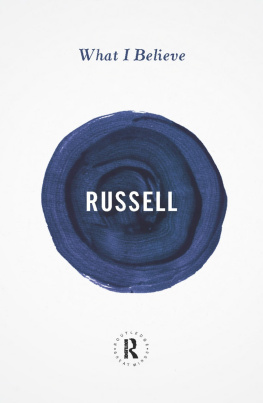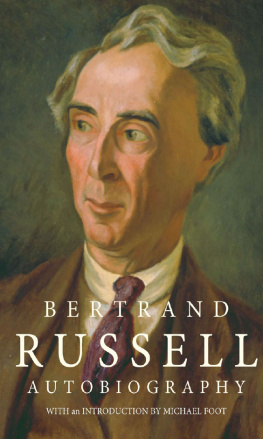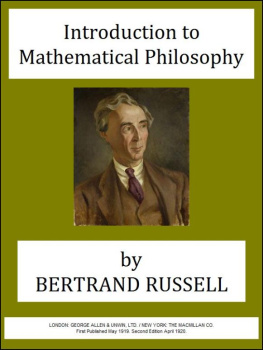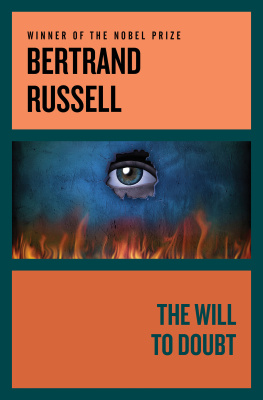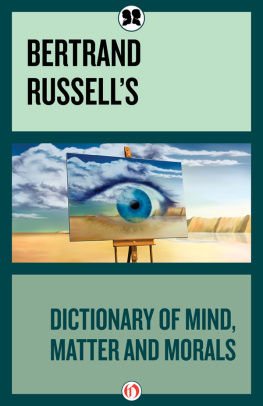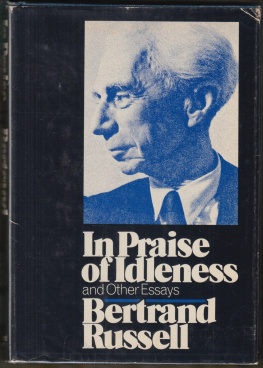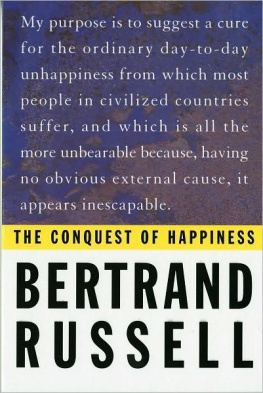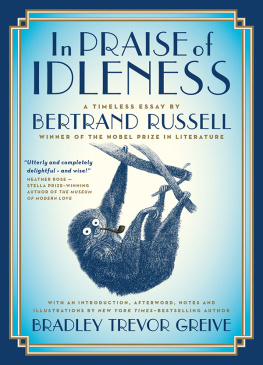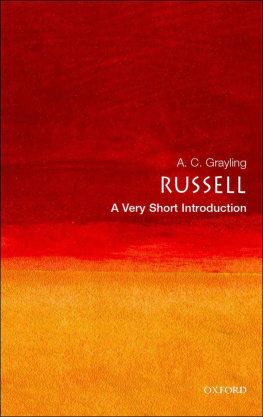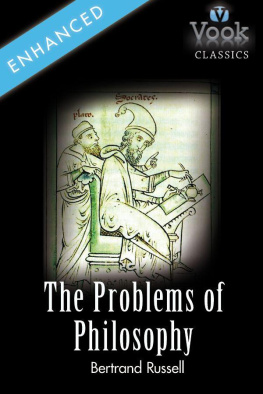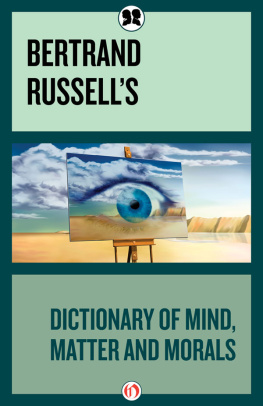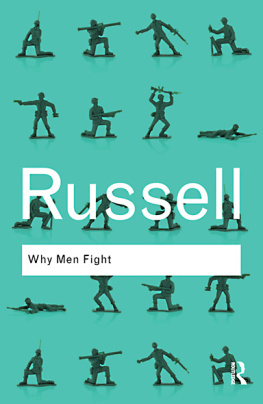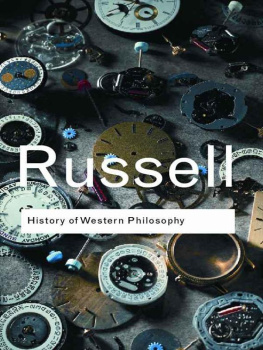| What I Believe |
| Bertrand Russell |
| Libre Dionysia (2020) |
|
| Tags: | Non-Fiction, Philosophy |
| Non-Fictionttt Philosophyttt |
Along with Why I Am Not a Christian , this essay must rank as the most articulate example of Russell's famed atheism. It is also one of the most notorious. Used as evidence in a 1940 court case in which Russell was declared unfit to teach college-level philosophy, What I Believe was to become one of his most defining works. The ideas contained within were and are controversial, contentious and - to the religious - downright blasphemous. A remarkable work, it remains the best concise introduction to Russell's thought.
Bertrand
Russell
What I Believe
With a new preface by Alan Ryan
Routledge Classics contains the very best of Routledge publishing over the past century or so, books that have, by popular consent, become established as classics in their field. Drawing on a fantastic heritage of innovative writing published by Routledge and its associated imprints, this series makes available in attractive, affordable form some of the most important works of modern times.
Conversion, 2020, Libre Dionysia
Libre Dionysia - Making texts available and e-reader friendly. All ePubs are manually generated and edited from sourced PDF files or physical books.
First published 1925
by Kegan Paul, Trench Trubner & Co Ltd, London
First published in Routledge Classics 2004
by Routledge
11 New Fetter Lane, London EC4P4EE
Routledge is an imprint of the Taylor & Francis Group
This edition published in the Taylor & Francis e-Library, 2004.
1996 The Bertrand Russell Peace Foundation Ltd
Preface to Routledge Classics edition 2004 Alan Ryan
All rights reserved. No part of this book may be reprinted or reproduced or utilized in any form or by any electronic, mechanical, or other means, now known or hereafter invented, including photocopying and recording, or in any information storage or retrieval system, without permission in writing from the publishers.
British Library Cataloguing in Publication Data
A catalogue record for this book is available from the British Library
ISBN 0-203-49960-3 Master e-book ISBN
ISBN 0-203-57426-5 (Adobe eReader Format)
ISBN 0-415-32509-9 (Print Edition)
Preface to the Routledge Classics
Fifty years after reading Bertrand Russell for the first time, I read him today with mixed feelings. In the middle 1950s, his History of Western Philosophy was a treat to teenage schoolboys bored to death with the slog of O Level. It gave us all the weapons we needed to torment the school chaplain when he tried to explain to agnostic teenagers Aquinass Five Ways to the knowledge of Gods existence. Why I am not a Christian was an even more valuable weapon against authority. My housemasters belief that Russells four marriages discredited his views on sex, God and nuclear warfare only confirmed my view that most holders of authority were bigoted, illogical and not to be taken seriously.
I have not wholly changed my mind. Russells four marriages are irrelevant to his views on sex, God and nuclear warfare; I now think that his marital difficulties should have made him more wary about making the pursuit of happiness look easy, but his ideas about what the good life is wear well. He had many vices as a critic of views he disliked, and his practice was at odds with his professed principle of taking on ones opponents at their strongest points rather than their weakest. In those ways, he was less admirable than John Stuart Mill. On the other hand, he was, and is, much more fun. In particular, he wrote wonderfully; even the articles he turned out for the Hearst newspapers at fifty dollars a pop, in order to support Beacon Hill, the school that he and his second wife had created, are not only quick and clever, but thought-provoking too. If Britain took literacy seriously, teenagers would be given Russell as a model essayist.
During the First World War Russell realized that he had an extraordinary talent for lecturing to lay audiences. He was deeply opposed to the war and, as a member of the Union for Democratic Control early in the war and later as a leading figure in the No-Conscription Fellowship, he worked unceasingly to bring the war to an early end, to persuade the United States to remain neutral, and to protect conscientious objectors from abuse at the hand of the tribunals that heard their case for exemption, and from ill-treatment in prison or the army, if they ended up there. These activities cost him his lecturership at Trinity College, Cambridge, but they brought him into a new world, too.
In addition to the innumerable meetings aimed directly at bringing an end to the war and saving objectors from conscription, Russell gave a strikingly successful series of lectures on The Principles of Social Reconstruction. To the extent that he had a single political philosophy, it was contained in the short book that the lectures became. Much that is taken for granted in What I Believe is argued for at some length in The Principles of Social Reconstruction. Three crucial premises are worth bringing into the light.
Russells view of human behaviour was rooted in the empiricist tradition that held that desire propels all action, and that the role of reason is to tell us how to achieve what we are after, not what we should be after in the first place. Or, as Hume put it with the sharpness that Russell relished, reason is and ought to be the slave of the passions. This was not an argument for impulsiveness in the ordinary sense: Russell believed that we should think very hard about what we are up to, and he wanted more, and more scientifically informed, reflection on what we ought to do with our lives. It was an argument for trying to understand what it is that we do really want. Russells views about the basis of our desires went farther than that. He was well acquainted with the work of W H. Rivers, the psychiatrist who treated Siegfried Sassoon and many others for shell shock, and who was one of the first people in England to take the measure of Freud. Rivers thought Freud exaggerated his insights, but had no doubt that we are all much more at the mercy of hidden impulses than we like to think. So did Russell.
In particular, Russell came close to believing that human beings were instinctively impelled to destruction for its own sake, something that Freuds account of the death wish also suggests. It was so obvious to him that war between nation states was unnecessary, and therefore deeply stupid, that he found it hard to believe that anything could explain it other than a passion for destruction and a desire by the combatants to inflict suffering on others at no matter what price in suffering for themselves. To believe anything so nihilistic, however, would have made Russells pacifism futile. If we are determined to destroy ourselves for no good reason, the only interesting question is how long it will be before we find the technology to wipe ourselves out completely. Russell was always ready for rhetorical purposes to represent his opponents as imbued with a passion to commit mass murder and mass suicide, but in his more analytical moments, he proposed a different and more elaborate view
This view was the second premise of his politics. He argued in Principles that there are two kinds of impulse; the possessive impulse seeks exclusive ownership of whatever it lights on, and leads us to compete with each other, while the creative impulse leads us to look for things that can be had by one person without anyone else being any the worse for it. If German scientists discover dazzling new theorems in physics, it leaves no fewer dazzling new theorems to be discovered by French and British scientists, whereas the German seizure of South West Africa leaves so much the less territory for the French and British, to say nothing of the original inhabitants. If possessiveness gets attached to national glory, and national glory is then conceived as requiring the humiliation of other nations, we have the recipe for endless wars. Peace and happiness can only be secured by encouraging the creative instincts and diverting the possessive instincts to useful or at any rate harmless ends.

